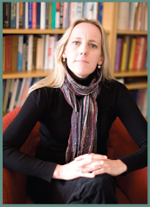What Can We Say about the 2016 Presidential Candidates?

The challenge for a magazine published by a nonprofit that enjoys tax-exempt status is to discuss the U.S. presidential election without directly supporting or opposing any of the candidates. We may offer commentary and analysis on the candidates’ policies, positions, and behavior, and we can certainly talk about the behavior of the voters and analyze their reasons for supporting or opposing a given candidate. Which is precisely what ethnographer Nancie Loudon Gonzalez does in this issue’s cover story.
In her unique application of the legend of Robin Hood and of Russian philosopher Mikhail Bakhtin’s notion of the carnivalesque, Gonzalez offers us a fascinating analysis of the 2016 presidential race. She explores pre-Lent carnivals of the Middle Ages, where the lower classes could celebrate and let off steam. Where vulgarity abounded, pranks were pulled, and the frustrations of the have-nots boiled over. “Ring any bells?” Gonzalez asks in providing detailed perspectives on the past and present.
Without a doubt, the 2016 race has been one of the most dramatic, chaotic, vivid, and unsettling political campaigns anyone can remember (and we’re still in the midst of it). But as the cover story illuminates, it may also be one of the most valuable for its potential to disrupt the social order and effect meaningful change for the masses.
Just as we can distinguish the presidential candidates as Democrat or Republican, we can also characterize candidates as establishment or anti-establishment. Former Secretary of State Hillary Clinton certainly has the support of the Democratic Party machine and Senator Ted Cruz (R-TX) is the GOP’s chance to stave off the nomination of businessman Donald Trump. But a large section of the American populace has embraced Trump and Senator Bernie Sanders (D-VT)—once thought long shots for the presidency—in a kind of carnival frenzy, collectively kicking a dent in the power structures blamed for income inequality and financial insecurity, for terrorist threats, racial injustice, and a list of other grievances. Both Trump and Sanders are anti-establishment—both eschew money from super PACs—and both have gotten a lot of votes. “Like many of the carnivalesque leaders in earlier societies,” Gonzalez writes, “their candidacies really might help produce some of the changes in policy needed to respond to those searching for the so-called cup of liberty.”
Speaking at the March 28 ceremony for the Robin Toner Prize (recognizing outstanding political journalism), President Barack Obama said of the 2016 presidential race, “I wouldn’t call it a carnival atmosphere, because that implies fun.” While it may not be fun, it’s revealing, and we should expect all the candidates to see and consider the people’s frustration.
As for the role of humanism in all this, AHA Legal Director David Niose contends in a recent Psychology Today piece that while liberal churches have long played a role in progressive movements, they may be losing ground as more and more young people give up religion. Can organized humanism help fill the void? “Humanist groups have been springing up around the country and indeed the world, many of them well positioned to serve as instruments of change,” Niose writes. “With neither labor nor liberal religion nearly as influential as they were in their heydays, strong and autonomous organizations that are poised to enunciate a progressive vision, and fight for it as well, are few and far between. If there is any hope of maintaining constant pressure on the political establishment to move toward major, transformative change, humanists surely must play a role.” AHA President Rebecca Hale and Vice President Jenny Kalmanson issue a similar call herein for organized humanism to enter a new stage of action. As the AHA celebrates its 75th anniversary in Chicago this summer, let’s all grab our folding chairs (as the subject of our Humanist Profile, Shirley Chisholm, would say) and bring them to the national table.
